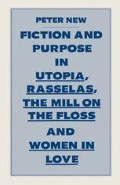Abstract
The fact that Women in Love was written during the First World War clearly influenced some of the attitudes it includes, as I shall show later, but Lawrence’s belief, that the human ideals of the past were dead, was no temporary reaction to the upheaval of that time. In 1927 he expressed very clearly his rejection of the old models of man, which he thought could mean rejecting models altogether: ‘All our education is but the elaborating of the picture. “A good little girl” — “a brave boy” — “a noble woman” — “a strong man” — “a productive society” — “a progressive humanity” — it is all the picture. It is all living from the outside to the inside. It is all the death of spontaneity .... If we could once get into our heads — or if we once dare to admit to one another — that we are not the picture, and the picture is not what we are, then we might lay a new hold on life. For the picture is really the death, and certainly the neurosis of us all.’1 Some of the characters in Women in Love live according to the old pictures; many react against them in a merely mechanical way, which Lawrence regards as equally destructive of life; only Birkin and Ursula gradually learn to lay a new hold on life’. I shall discuss Birkin and Ursula in the next chapter; in this I want to examine Lawrence’s attitude to the dead ends of the other characters.
Access this chapter
Tax calculation will be finalised at checkout
Purchases are for personal use only
Preview
Unable to display preview. Download preview PDF.
Notes
Review of Trigant Burrow (1927), in Phoenix [vol. I] (1936), p. 380.
Copyright information
© 1985 Peter New
About this chapter
Cite this chapter
New, P. (1985). Women in Love: Dead Ends. In: Fiction and Purpose in Utopia, Rasselas, The Mill on the Floss and Women in Love. Palgrave Macmillan, London. https://doi.org/10.1007/978-1-349-07704-5_13
Download citation
DOI: https://doi.org/10.1007/978-1-349-07704-5_13
Publisher Name: Palgrave Macmillan, London
Print ISBN: 978-1-349-07706-9
Online ISBN: 978-1-349-07704-5
eBook Packages: Palgrave Literature & Performing Arts CollectionLiterature, Cultural and Media Studies (R0)

